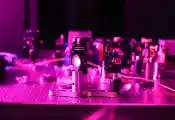£3.4m Project Aims to Develop First Commercial Cold Atom Quantum Clock
Aquark Technologies, a cutting-edge company based in Southampton, has recently secured a substantial £3.4m contract from Innovate UK to advance its groundbreaking cold atom clock, known as AQlock. This innovative clock is set to become the first of its kind in the UK, offering unparalleled precision and resilience for positioning and navigation applications.
Cold atom clocks, such as the AQlock, operate by utilizing atoms that have been cooled to temperatures approaching absolute zero. What sets Aquark's technology apart is its unique laser cooling method, referred to as super molasses, which eliminates the need for a magnetic field to trap atoms. This distinctive approach not only enhances portability and durability but also streamlines the commercial production process.
"The funding from Innovate UK will facilitate the transition of AQlock into a commercially viable product through rigorous testing in both laboratory and real-world environments," stated Andrei Dragomir, the CEO of Aquark. "The deployment of AQlock will pave the way for the integration of quantum-enabled systems on a global scale, while concurrently establishing a UK-centric supply chain, offering the potential for a significant shift away from GNSS dependency towards British quantum technology."
Designed to seamlessly integrate with existing systems, AQlock serves as a complementary or supplementary component to GNSS-enabled technology. Initial target industries include telecommunications, defense, finance, and aviation, with input from committed end-users shaping the technical evolution of the product.
The UK's heavy reliance on GNSS for positioning, navigation, and timing within cellular networks has long been recognized as a vulnerability. The imperative to develop a more robust PNT system aligns with the UK government's strategic initiatives, such as the New framework for Greater Position, Navigation, and Timing Resilience and the National Quantum Strategy.
Utilizing cold atoms as the foundation for position, navigation, and timing represents a significant advancement in performance and autonomy compared to existing solutions. However, the complexity, size, and power requirements of traditional cold-atom traps have hindered their practical utility. Aquark has successfully surmounted this obstacle by reducing the reliance on magnetic field manipulation and shrinking the cold-atom engine, enabling widespread deployment of precise sensors, quantum clocks, GNSS-independent navigation, and quantum computing.
During a previous project funded by Innovate UK, Aquark demonstrated the feasibility of its cold atom quantum clock technology, showcasing a technical proof-of-concept with an open-loop clock signal. The company achieved a milestone by continuously trapping cold atoms suitable for sensing while conducting field trials on a quadcopter drone, in collaboration with MBDA and Innovate UK, and flown by Wright Airborne Computing.
The entire system, weighing under 10 kg, exhibited resilience in extreme conditions, enduring freezing temperatures, high humidity fog, and complex flight maneuvers. Operating autonomously for over an hour on internal power during full-day trials, Aquark's innovative technology promises to revolutionize the landscape of quantum-enabled systems.




































